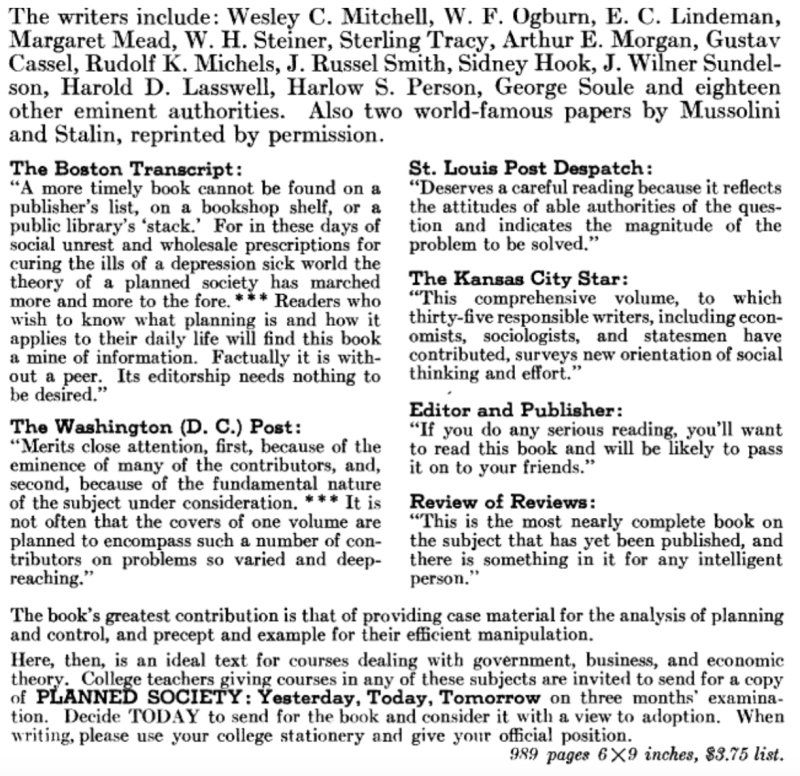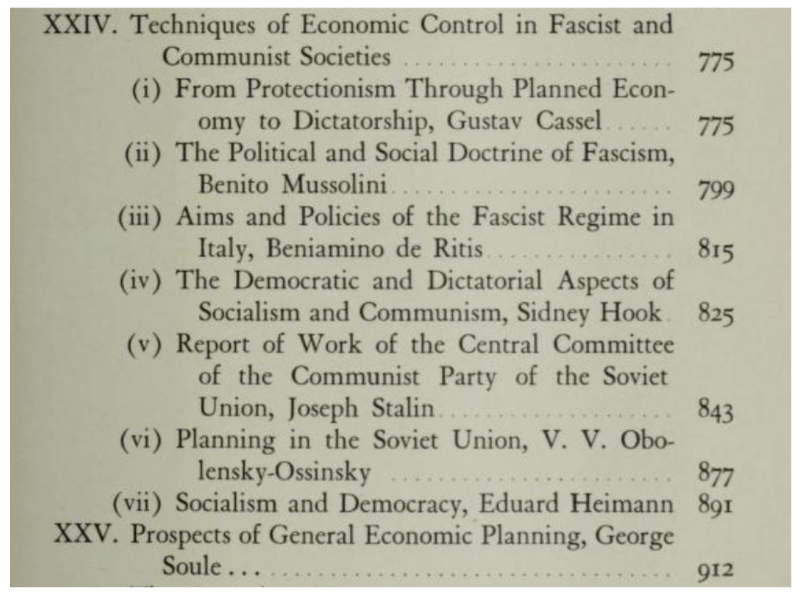The Machinery of Fascism
This post The Machinery of Fascism appeared first on Daily Reckoning.
Fascism became a swear word in the U.S. and the U.K. during the Second World War. It’s been ever since, to the point that the content of the term has been drained away completely. It’s not a system of political economy but an insult.
If we go back a decade before the war, you find a completely different situation. Read any writings from polite society from 1932–1940 or so and you find a consensus that freedom and democracy, along with Enlightenment-style liberalism of the 18th century, were completely doomed.
They should be replaced by some version of what was called the planned society, of which fascism was one option.
A book by that name Planned Society appeared in 1937 published by the prestigious Prentice Hall, and it included contributions by top academics and high-profile influencers. It was highly praised by all respectable outlets at the time.

Everyone in the book was explaining how the future would be constructed by the finest minds who would manage whole economies and societies, the best and the brightest with full power.
All housing should be provided by government, for example, and food too, but with the cooperation of private corporations. That seems to be the consensus in the book. Fascism was treated as a legitimate path. Even the word “totalitarianism” was invoked without opprobrium but rather with respect.
The book has been memory-holed of course.
You’ll notice that the section on economics includes contributions by Benito Mussolini and Joseph Stalin. Yes, their ideas and political rule were part of the prevailing conversation. It’s in this essay, likely ghostwritten by Professor Giovanni Gentile, minister of public education, in which Mussolini offered this concise statement: “Fascism is more appropriately called corporatism, for it is the perfect merge of State and corporate power.”

All of this became rather embarrassing after the war so it was largely forgotten. But the affection many sectors of the U.S. ruling class had for fascism was still in place. It merely took on new names.
As a result, the lesson of the war, that the U.S. should stand for freedom above all else while wholly rejecting fascism as a system, was largely buried. And generations have been taught to regard fascism as nothing but a quirky and failed system of the past, leaving the word as an insult to fling at in any way deemed reactionary or old-fashioned, which makes no sense.
Below, I show you how fascism is really corporatism — and how it’s alive and well today. Read on.
Fascism Is Corporatism
By Jeffrey Tucker
There’s valuable literature on the topic and it bears reading. One book that is particularly insightful is the 1939 book The Vampire Economy, by Gunter Reimann, a financier in Germany who chronicled the dramatic changes to industrial structures under the Nazis.
In a few short years, from 1933–1939, a nation of enterprise and small shopkeepers was converted to a corporate-dominated machine that gutted the middle class and cartelized industry in preparation for war.
“The corruption in fascist countries arises inevitably from the reversal of the roles of the capitalist and the State as wielders of economic power,” wrote Reimann.
The Nazis weren’t hostile to business as a whole but only opposed traditional, independent, family-owned small businesses that offered nothing for purposes of nation-building and war planning.
The crucial tool to make this happen was establishing the Nazi Party as the central regulator of all enterprises. The large businesses had the resources to comply and the wherewithal to develop good relations with political masters whereas the undercapitalized small businesses were squeezed to the point of extinction.
“Most businessmen in a totalitarian economy feel safer if they have a protector in the State or Party bureaucracy,” Reimann writes. “They pay for their protection as did the helpless peasants of feudal days. It is inherent in the present lineup of forces, however, that the official is often sufficiently independent to take the money but fails to provide the protection.”
He wrote of:
The decline and ruin of the genuinely independent businessman, who was the master of his enterprise, and exercised his property rights. This type of capitalist is disappearing but another type is prospering.
He enriches himself through his Party ties; he himself is a Party member devoted to the Fuehrer, favored by the bureaucracy, entrenched because of family connections and political affiliations. In a number of cases, the wealth of these Party capitalists has been created through the Party’s exercise of naked power.
It is to the advantage of these capitalists to strengthen the Party which has strengthened them. Incidentally, it sometimes happens that they become so strong that they constitute a danger to the system, upon which they are liquidated or “purged.”
This was particularly true for independent publishers and distributors. Their gradual bankruptcy served to effectively nationalize all surviving media outlets who knew it was in their interests to echo Nazi Party priorities.
Reimann wrote: “The logical outcome of a fascist system is that all newspapers, news services, and magazines become more or less direct organs of the fascist party and State. They are governmental institutions over which individual capitalists have no control and very little influence except as they are loyal supporters or members of the all-powerful party.”
“Under fascism or any totalitarian regime an editor no longer can act independently,” wrote Reimann:
Opinions are dangerous. He must be willing to print any “news” issued by State propaganda agencies, even when he knows it to be completely at variance with the facts, and he must suppress real news which reflects upon the wisdom of the leader. His editorials can differ from another newspaper’s only insofar as he expresses the same idea in different language. He has no choice between truth and falsehood, for he is merely a State official for whom “truth” and “honesty” do not exist as a moral problem but are identical with the interests of the Party.”
A feature of the policy included aggressive price controls. They didn’t work to suppress inflation but they were politically useful in other ways. “Under such circumstances nearly every businessman necessarily becomes a potential criminal in the eyes of the Government,” wrote Reimann.
“There is scarcely a manufacturer or shopkeeper who, intentionally or unintentionally, has not violated one of the price decrees. This has the effect of lowering the authority of the State; on the other hand, it also makes the State authorities more feared, for no businessman knows when he may be severely penalized,” he wrote.
I can only highly recommend this book as a brilliant inside look at how enterprise functions under a fascist-style regime. The German case was fascism with a racialist and anti-Jewish twist for purposes of political purges.
In 1939, it was not entirely obvious how this would end in mass and targeted extermination on a gargantuan scale. The German system in those days bore much resemblance to the Italian case, which was fascism without the ambition of full ethnic cleansing. In that case, it bears examination as a model for how fascism can reveal itself in other contexts.
The best book I’ve seen on the Italian case is John T. Flynn’s 1944 classic As We Go Marching. Flynn was a widely respected journalist, historian and scholar in the 1930s who was largely forgotten after the war due to his political activities.
His book deconstructs the history of fascist ideology in Italy from a half-century prior and explains the centralizing ethos of the system, both in politics and economics.
Following an erudite examination of the main theorists, Flynn provides a beautiful summary. Fascism, Flynn writes, is a form of social organization:
-
- In which the government acknowledges no restraint upon its powers — totalitarianism.
- In which this unrestrained government is managed by a dictator — the leadership principle.
- In which the government is organized to operate the capitalist system and enable it to function under an immense bureaucracy.
- In which the economic society is organized on the syndicalist model; that is, by producing groups formed into craft and professional categories under supervision of the state.
- In which the government and the syndicalist organizations operate the capitalist society on the planned, autarchical principle.
- In which the government holds itself responsible for providing the nation with adequate purchasing power by public spending and borrowing.
- In which militarism is used as a conscious mechanism of government spending.
- In which imperialism is included as a policy inevitably flowing from militarism as well as other elements of fascism.
Each point bears longer commentary but let’s focus on No. 5 in particular, with its focus on syndicalist organizations. In those days, they were large corporations run with an emphasis on union organization of the workforce.
In our own times, these have been replaced by a managerial overclass in tech and pharma that have the ear of government and have developed close ties with the public sector, each depending on the other. Here’s where we get the essential bones and meat of why this system is called corporatist.
In today’s polarized political environment, the left continues to worry about unbridled capitalism while the right is forever on the lookout for the enemy of full-blown socialism. Each side has reduced fascistic corporatism to a historic problem on the level of witch burning, fully conquered but useful as a historical reference to form a contemporary insult against the other side.
As a result, and armed with partisan bete noires that bear no resemblance to any really existing threat, hardly anyone who’s politically engaged and active is fully aware that there’s nothing particularly new about what is called the Great Reset.
It’s a corporatist model — a combination of the worst of capitalism and socialism without limits — of privileging the elite at the expense of the many which is why these historic works by Reimann and Flynn seem so familiar to us today.
And yet, for some strange reason, the tactile reality of fascism in practice — not the insult but the historical system — is hardly known either in popular or academic culture. That makes it all the easier to reimplement such a system in our time.
The post The Machinery of Fascism appeared first on Daily Reckoning.
This story originally appeared in the Daily Reckoning
Source: https://dailyreckoning.com/the-machinery-of-fascism/
Anyone can join.
Anyone can contribute.
Anyone can become informed about their world.
"United We Stand" Click Here To Create Your Personal Citizen Journalist Account Today, Be Sure To Invite Your Friends.
Please Help Support BeforeitsNews by trying our Natural Health Products below!
Order by Phone at 888-809-8385 or online at https://mitocopper.com M - F 9am to 5pm EST
Order by Phone at 866-388-7003 or online at https://www.herbanomic.com M - F 9am to 5pm EST
Order by Phone at 866-388-7003 or online at https://www.herbanomics.com M - F 9am to 5pm EST
Humic & Fulvic Trace Minerals Complex - Nature's most important supplement! Vivid Dreams again!
HNEX HydroNano EXtracellular Water - Improve immune system health and reduce inflammation.
Ultimate Clinical Potency Curcumin - Natural pain relief, reduce inflammation and so much more.
MitoCopper - Bioavailable Copper destroys pathogens and gives you more energy. (See Blood Video)
Oxy Powder - Natural Colon Cleanser! Cleans out toxic buildup with oxygen!
Nascent Iodine - Promotes detoxification, mental focus and thyroid health.
Smart Meter Cover - Reduces Smart Meter radiation by 96%! (See Video).





